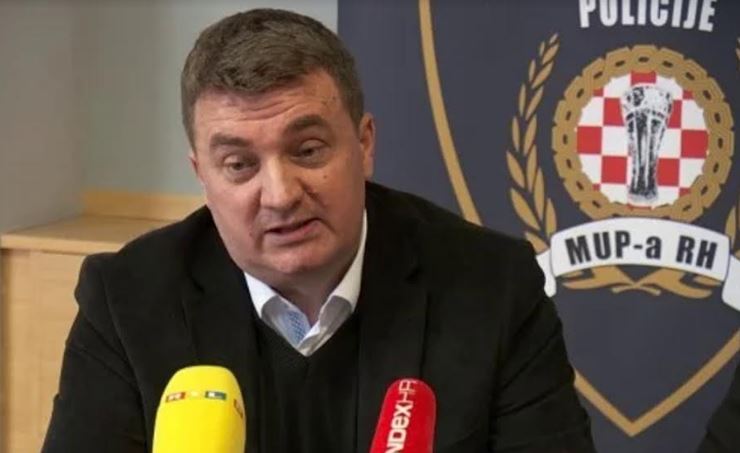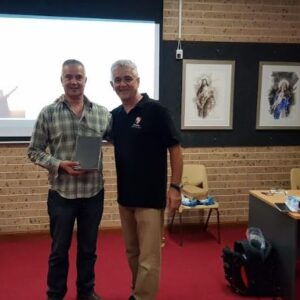In any global or international community agenda small countries suffer and are left to their own devices to live with consequences that are often harsh, that more often than not, mean that someone ends up with their human rights brutally violated.
On the point of global pressure where someone ends up a victim of human rights usurpation, I am transported back to Croatia 1997/1998 when, highly pressured by the international powers (in particular the European Union and Bill Clinton’s or Democrats’ America) to make deals in the process of reintegrating (liberating) the remaining parts of Croatia occupied by the brutal and murderous Serb aggressor. The deal included the granting of amnesty to hundreds of Serbs from prosecution for suspected and evidenced war crimes committed against Croatian people. And so, the Croatian authorities at the time caved into this pressure in which the international community was insisting that Serbs’ human rights must be protected, that they must be allowed to live without fear of prosecution or retribution if they returned to Croatia (most of these war criminals had already fled Croatia into Serbia)! The human rights of Croatian victims of Serb aggression, of war crimes, were not as important.
Scandalous!
Some twenty years later, today, the situation Croatia is faced with is that Serb war criminals or suspected war criminals are moving freely, living in Croatia, among their victims! Protected! So, it is not unusual to come across in Vukovar, for instance, Serb rapists, murderers, torturers who have returned to live in that area. Of course, whether on justice or humanity’s level, this is not acceptable! This naturally causes perpetual protests and distress on the side of Croats. And what does Croatia’s Prime Minister Andrej Plenkovic do? He takes Croatian Serb leaders who in Croatia chase after Serbia’s interests rather than Croatia’s, Milorad Pupovac, Boris Milosevic (and others), whose brothers, sisters etc are among those brutal Serb aggressors from 1990’s, as coalition partners in government! Talk about rubbing salt on open wounds!
For the duration of Pupovac being a part of Plenkovic government Nikola Kajkic, an investigating officer with Croatian Police Unit for War Crimes, was suspended from duties in July 2018 just as his investigation into executions by Serbia’s forces at Ovcara farm (Vukovar, November 1991) was showing up irrefutable evidence for war crimes for several Serb nationals (some of whom live in Vukovar or nearby!)! He is still fighting the bent courts to get his job back; he remains unemployed and a sore in the Serb and Croatian government eyes. Kajkic courageously continues (via various independent media outlets) to bring out various concrete details and names of Serbs, who now live in Vukovar or elsewhere in Croatia, who had murdered, raped or tortured Croatian people during the Serb aggression against Croatia in the 1990’s.
As to an impending global “Great Reset” lots of people are talking about these days Croatian government and authorities need a great morality and justice reset and start paying priority attention to the victims of Serb war crimes. It is evident, twenty years on, that the 1997/1998 grant of amnesty to Serb war criminals is reaping havoc and unbearable distress and injustice in Croatia. So, let’s revisit how this tragic move to grant amnesty to war criminals came about and gave licence to Serb torturers, rapists and murderers to roam the streets of Croatia today under the protection of the internationally (including Serbia) weaved pressures and tricks.
Since the hostilities resulting from Serb aggression in 1991, the Ministry of Justice of the Croatian government had maintained lists of suspected Serb war criminals, numbering as many as 3,000 at one point. These official lists had frequently been criticised by the international community pushing for amnesty of Serb war criminals in Croatia for inaccuracies and uncertainties. In February 1997, a Vinkovci newspaper published a list of suspected war criminals including 1,200 names. At the same time, pressured by international forces who, under a pretence it wanted to achieve peace, obviously favoured the aggressor more than the victim, the Croatian government had passed several laws granting amnesty for those who engaged in certain acts relating to the war in 1991 and thereafter. The laws granted amnesties to all those who committed “criminal acts during the aggression, armed rebellion or armed conflicts, in or relating to the aggression, armed rebellion or armed conflicts in the Republic of Croatia . . . during the period from 17 August 1990 to 23 August 1996” (Law of General Amnesty, Croatia). The law expressly excluded those who had committed “flagrant violations of humanitarian law having the character of war crimes.” The passage of the law was followed by the circulation of a list of ninety-six persons who were then in detention on charges of armed rebellion.
After promulgation of the amnesty law, the Croatian government continued to retain a list of 311 Serb war crimes suspects. This list was criticised for inaccuracies and errors by the Serbian side, saying some of the named were already dead.(So what, posthumous trials are not a thing of impossibility) The existence of this list of war crimes suspects had not been embraced by the Serb Executive Council (the assembly of the Eastern Slavonia Serb leadership) and on the minds of many Serbs in Eastern Slavonia who contemplated decisions as to whether to remain in Croatia. As a result, Transitional Administrator Jacques Paul Klein requested the Croatian government to produce a smaller list, with those who are not on the list being de facto amnestied. In March 1997, Mr. Klein received a new list of 150 names which he passed on to the Serb Executive Council, which, in turn, notified those on the list. This list contained the names of those who have been convicted in absentia for crimes against international humanitarian law, those who had been indicted for such crimes, and those who were otherwise suspected of having committed such crimes. (“Amnesty,” UNTAES Bulletin, No. 28, March 1997)
The negotiations over the lists and amnesty laws raised several fundamental human rights concerns. First, throughout negotiation over the size of the list, it was claimed that the standards for inclusion on the war crimes list were not made clear. Even after the list had been given to Mr. Klein, the grounds for inclusion on the list allegedly remained unclear, especially for those who have not already been indicted or tried in absentia. So claimed the international community involved in pressuring Croatia for amnesty of Serbs. The same international community insisted that an effective safeguard would be for Croatia to refer war crimes indictments to the International Criminal Tribunal for the former Yugoslavia (ICTY) for prior review.
But what does one do when one knew and now knows that ICTY’s crimes indictments were often political rather than based on clear evidence! One would insist on protecting one’s own people – victims of crimes that were seen on daily basis against Croatian civilians and armed forces.
UNTAES’s (UN Transitional Administration of Eastern Slavonic, in Croatia) insistence that the government of Croatia provide a “final” list of suspects also raised serious human rights concerns for Serb aggressor, evidently diminishing the importance of Croatian victim human rights. “Now, we have asked the Croatian Government for a final list very soon and before the elections. The list should have those names who, we believe, would possibly be indicted by the War Crimes Tribunal at The Hague if there was enough evidence. By that definition, everyone else is automatically amnestied,” said Mr Klein in “Elections announced for 13 April: an interview with TA Jacques Klein,” UNTAES Bulletin, No. 25, February 1997.
If those who commit war crimes are to be held accountable for their crimes, it is unclear in what sense any list of suspects provided by the Croatian government could have been considered final. If sound legal principles were to govern the indictment and trial of suspected war criminals, the Croatian government should have indicted those against whom sufficient evidence of such crimes was gathered, regardless of whether this evidence came to light before or after a “final” list was prepared. Indeed, several Croats, including relatives of those who were killed or “disappeared” during and after the siege of Vukovar told Human Rights Watch/Helsinki of their discomfort over what they perceived to be “private” negotiations between UNTAES and the Croatian government regarding the length of the list of suspects. They feared such negotiations might result in the removal of war crimes suspects from the list, as a matter of political expediency, rather than through a judicial process that would have determined the absence of an evidentiary basis for prosecution (Human Rights Watch/Helsinki interviews, Zagreb, February 23, 1997).
Human Rights Watch/Helsinki recognised that the list of suspected war criminals had powerful political force: it said that it intimidated Serbs in Eastern Slavonia while appeasing Croats who have lost family members in that region. Given the political nature of the list, UNTAES may have felt compelled, as the administrative body of the region, to address it in a political context. However, entering into (or appearing to enter into) negotiations over who will or will not be prosecuted for war crimes, politicises a process that should be subjected solely to legal considerations. These negotiations ran the risk of compromising not only UNTAES’s credibility but also the legitimacy of any future proceedings against suspects, as there will be suspicions that some Serbs were dropped as suspects in a political “deal” engineered by UNTAES. At the least, the controversy and negotiations over the number of names on the list has distracted attention from the fundamental rights to due process and fair trial.
The list, in the meanwhile, continued to raise more questions than it answered. Only in early March 1997 did it become clear that the list comprised only those who faced indictments in the courts of Osijek and Vinkovci. As a result, Serbs who perpetrated crimes in Eastern Slavonia who were not included on the “final” list were still faced with the possibility of indictment on charges relating to serious violations of humanitarian law for acts carried out in other jurisdictions, such as those of Knin and Sisak.
The temptation to suspend justice in exchange for promises to end a conflict had arisen with respect to the international community pressures work in Darfur, Uganda and in Croatia in 1997/1998, and threatened to recur elsewhere as parties and mediators struggle to negotiate peace deals. Indeed, to get parties to the table, blanket amnesties have often in the past been offered to those responsible for horrific human rights abuses. Supporters of amnesties argued that those bearing the greatest responsibility for atrocities have no interest in laying down their arms unless they believe that they will not face criminal charges. Others have argued that while justice is important, it should take a back seat to peace!
In the short-term, it is easy to understand the temptation to forego justice in an effort to end armed conflict. However, Human Rights Watch research over the past 20 years in many different countries has demonstrated that a decision to ignore atrocities and to reinforce a culture of impunity may carry a high price. While there are undoubtedly many factors that influence the resumption of armed conflict, and it is not asserted that impunity is the sole causal factor, Human Rights Watch research shows that the impact of justice is too often undervalued when weighing objectives in resolving a conflict.
Foregoing accountability, on the other hand, often does not result in the hoped-for benefits. Instead of putting a conflict to rest, an explicit de jure amnesty that grants immunity for war crimes, crimes against humanity, or genocide may effectively sanction the commission of grave crimes without providing the desired objective of peace. All too often a peace that is conditioned on impunity for these most serious crimes is not sustainable. Even worse, it sets a precedent of impunity for atrocities that encourages future abuses.
In Croatia, for example, amnesty provisions failed to consolidate the hoped-for peace, that is, amnesties did not lead to the called for “forgiving and forgetting.” Serbia still denies aggression against Croatia, Croatia is helping it in attempts to equate victims with aggressors, while Croatian people are increasingly angry at this injustice. The so-called peaceful reintegration of Eastern Slavonia, Baranja and Western Syrmia (1995-1998) that rested upon amnesty given to Serb war criminals is anything but peaceful, for a great majority of Croatian people. It has kept the terrible wounds of Serb aggression wide open.
And so, twenty years on the Serb fight to protect their war criminals in Croatia from prosecution is still a current and pressing issue acting against the victims’ rights. Cover ups, suspensions from duties such as the one experienced by Nikola Kajkic are encouraged by the government that has as its Deputy Premier Boris Milosevic, a hard-core politician actively pursuing the interests of Serbia rather than Croatia on Croatian soil. Of course, Milorad Pupovac is his main ally and, it seems, Croatian Prime Minister Andrej Plenkovic and the remainder of his cherry-picked team! With them, Croatian national interests of defending the values of Homeland War and its victims have been lost, or rather, tossed away while wounds are still unhealed. Is this not a ground for a “Great Reset” in Croatia, starting with ditching the General Amnesty laws that protect criminals and aggressors? Justice has been short-changed in Croatia, thanks to international community pressure, it is time Croats started to look inside their country’s borders rather than outside if peace with justice is to prevail. Otherwise, fuelling fears for escalated unrest remain justified. Ina Vukic




